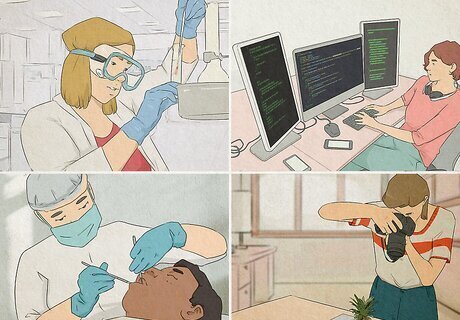
views
INTJ Cognitive Stack

Dominant: Introverted Intuition (Ni) INTJs are insightful visionaries. Those with the Intuition (N) trait use patterns and associations to process information. INTJs connect unconscious images and themes to see things in a new light. They rely on their inner insights and truths to guide them. The dominant process or function is the first characteristic you develop and is the most in control of your thought processes. Introverted traits in Myers-Briggs personalities refer to inward thoughts and reflections.

Auxiliary: Extraverted Thinking (Te) INTJs want order, control, and structure in their environment. Those with a Thinking (T) trait prefer objective information over emotional ones. Because of this, INTJs make decisions based on logic rather than emotions. The auxiliary process is the second most in-control function and works with the dominant process to help you understand the world around you. Extraverted traits in Myers-Briggs personalities refer to processing information through outward experiences.

Tertiary: Introverted Feeling (Fi) INTJs take their morals into account when making decisions. Those with the Feeling (F) trait seek connections with those that have similar personal values. As a tertiary function, this doesn’t control an INTJs decision making, but they can crave connection in times of need. The tertiary process is a less developed function that comes out during times of stress.

Inferior: Extraverted Sensing (Se) INTJs are present when they need to be. Those with the Sensing (S) trait are in tune with the present moment. As an inferior function, this gives INTJs the ability to hyperfocus on a task at hand, improving their efficiency without much effort. The inferior process is the least in-control function and is typically developed in later life. It’s mostly triggered during times of tremendous change or stress.
INTJ Strengths

INTJs are hard-working. Being extremely logical and analytical, INTJs value success. They’re strategic and strive to be the best in everything they do. They’re natural leaders and go-getters who will stop at nothing to achieve their goals and dreams. If you’re an INTJ, you most likely stay focused on one task until it’s achieved.

INTJs are intelligent. INTJs are devoted to being rational and correct. They’re highly intelligent and value evidence, research, and analysis. Because of this, they often think through their ideas and opinions thoroughly. They rarely jump to conclusions and like to sit on decisions before making them. If you’re an INTJ, you likely enjoy a good debate because it gives you a reason to explain your research and reasoning.

INTJs are independent. INTJs are creative and self-motivated. They like to do things their way and prefer to make decisions on their own in their own time. They’re natural introverts and do best in environments where they can be alone. If you’re an INTJ, you’re probably strongly opinionated and don’t like being told what to do.
INTJ Weaknesses

INTJs can be impatient. With their strong work ethic, INTJs quickly grow frustrated. They may get irritated if someone doesn’t live up to their standards or have the same drive. At the end of the day, they want to push people to their fullest potential. If you’re an INTJ, you’re likely constantly trying to improve the world around you so it can be as efficient as possible.

INTJs may be insensitive. INTJs can quickly dismiss emotions. They can get easily frustrated if someone’s being irrational, which is often the cause of strong emotions. Because they value logic, they can struggle with expressing emotions and being emotionally supportive. If you’re an INTJ, you may struggle to give a friend advice if they’re going through a hard time as you can’t fully understand their emotions.

INTJs are perfectionists. INTJs are often overly critical of themselves because they strive to be perfect. They hold themselves to high standards and can be their worst critics. Overall, they want to prove to the world that their capable of making a difference. If you’re an INTJ, you likely won’t stop at something until there are no problems to solve or mistakes to fix.
INTJ Relationships

Making friends can be difficult for INTJs. Being independent and self-sufficient, INTJs aren’t always openly sociable. They tend to have a small group of close-knit friends they’ve known for long periods of time but may have trouble opening up to new people. They typically avoid new social interactions when they can and usually bond with those who value the same things they do. If you’re an INTJ, don’t be afraid to step outside of your comfort zone every once in a while. Try saying “hi” to the new coworker or asking about an acquaintance’s day. If you’re befriending an INTJ, be patient. While they may not open up to you right away, they eventually will with time. Follow their pace and ease into the friendship one step at a time.

INTJs have a hard time in romantic relationships. Romance and partnerships don’t come easily to an INTJ. Their independence and self-reliance make it difficult to make joint decisions and sacrifices. They may also struggle to connect emotionally with someone as they’re more logical and rational. If you’re an INTJ, know it’s okay to be vulnerable. Not every relationship is an equation to be solved. Sometimes, you just have to see where life takes you. If you’re in a relationship with an INTJ, try expressing your emotions in a rational way. Explain why and how you feel a certain way to help an INTJ understand what you’re going through.
INTJ Careers

INTJs thrive in careers where they can be self-reliant. INTJs are incredibly insightful and inventive. Their independence is one of their greatest attributes in the workforce, as they can hold themselves accountable. They prefer looking to the future rather than the past and think logically. With all this in mind, INTJs do well in these careers: Architect Astronomer Attorney Business Analyst Cardiologist Chemical Engineer Computer Programmer Dentist Economist Graphic Designer Photographer Web Developer

















Comments
0 comment